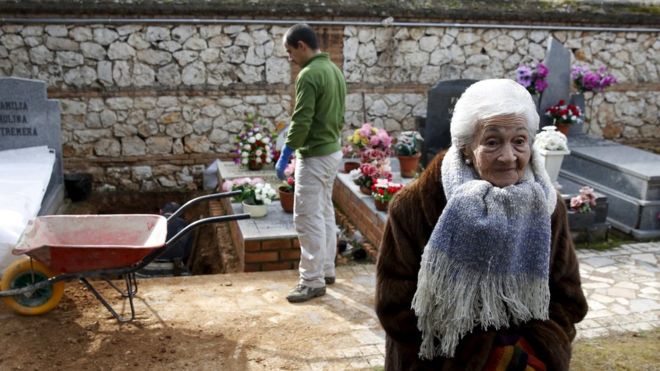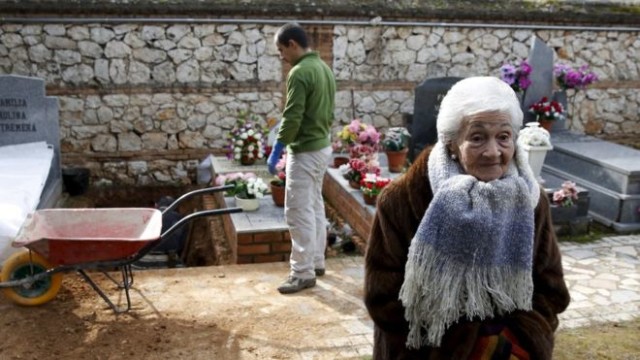Ascension Mendieta waited well over seven decades to get the only thing she ever really wanted. She boarded a plane to head to Spain to get justice. She is 90 years old, but is relieved that the moment has finally arrived. Volunteers removed the skeleton of her father from a mass grave located in the cemetery in Guadalajara, central Spain. Mendieta barely remembers her father, but now has the chance to be buried next to him. It was a momentous day for this lady, her family, and fellow campaigners.
There are still 100,000 missing victims from the Spanish Civil War, which took place from 1936-1939. General Franco and his Nationalist forces implemented ferocious repression during this time. Campaigners continue their efforts to gain closure for the many remaining families of his victims.
Ascension’s father Timoteo Mendieta Alcala was one of the estimated 822 executions carried out at the cemetery from 1939 to 1944. It is believed that he was executed along Guadalajara’s cemetery wall on November 16th, 1939. He was, a butcher and the father of seven children and had served as a local leader of the Socialist UGT union in the village of Sacedon.
Due to the tyrannical rule of the Franco era, his family was far too scared to ask for Alcala’s remains to be removed; they therefore stayed in that grave all these years along with the 21 other men buried with him. The Mendieta family is just one of thousands who have received little to no help from the Spanish state in locating and exhuming their dead relatives. The dictator died back in 1975, so it is quite baffling as to why families still have to seek aid and closure after all these years.
Volunteer organizations have successfully dug up hundreds of graves, but there is a reason Timoteo Mendieta’s remains are so important to highlight – his was the first exhumation ordered by a Spanish court as part of a criminal investigation. It took a complaint being heard by a judge in Argentina to facilitate this.
Local authorities had refused to recover the remains of Ascension’s father. In 2008, Spanish judge Baltasar Garzon abandoned his own investigation into what many have declared to be a genocide. Ms. Mendieta then traveled to Buenos Aires in 2013 when she got wind of the fact that an Argentine magistrate had ruled to continue the investigation of the Franco-era under the banner of universal justice.
Judge Maria Servini had heard from over 100 families who have continued the search for their relatives’ remains. Along the way she has charged many living members of Franco’s security services of alleged torture carried out during the final years of the dictatorship.
The Spanish judge exercised her authority to request the court to exhume the remains of this execution victim for identification purposes. This was monumental, demonstrating the first time a Spanish judge heeded this kind of petition from Argentina. Ms. Mendieta recognized that the Argentinians are the only ones who have helped make progress on this issue. She is angry that none of the democratic parties in Spain have done anything to help her or the other families in the past 40 years.
To this day, more than 100,000 victims remain in unmarked graves killed by pro-Franco forces during, and even after, the Spanish Civil War.
Nationalist victims that were executed by the Republican side of the war did however receive proper burial and memorials once Gen. Franco was no longer in power. For some unknown reason, since Franco’s death in 1975 almost no efforts have been made to locate and open the mass graves of Communists and Socialists.
One positive came from a law passed in 2007 which banned public symbols of Francoism. It also enabled subsidies for groups working to exhume and identify bodies for victim’s families. However, all funding for this initiative was cut off in 2012.
Despite Judge Garzon’s ruling to re-open inquiries into crimes against humanity by Franco’s forces, senior judges decided the statue of limitations had expired. Shockingly, the judge was then charged by the Supreme Court for abuse of power; he has since been exonerated.
Paco Ferrandiz, an anthropologist at Spain’s CSIC national science council, was there to witness the exhumation of Ms. Mendietta’s father. He declared that the state has done whatever it could to obstruct attempts to investigate what happened during that era. The indictment of the judge is a perfect example of the efforts to send a political message, to leave the victims of Franco to remain in unmarked graves.
Mr. Pacheco’s Association for the Recovery of Historical Memory (ARMH) is in charge of exhuming the remains of Mendieta and the 21 other bodies. The association runs on volunteers and donations from the Norwegian electrician’s union. There were 12 families that came during the dig to help identify the remains. All this time, records had been kept in Guadalajara’s municipal archives.
DNA from four specific skeletons will be sent over to Argentina to determine what should be given to Ascension Mendieta. Her sister passed away four years without gaining closure; they fought together for so long, and used to go to the cemetery to ask about the grave. Mendieta believes what happened to her father and family cannot be forgiven. He did not kill anyone in the war; he was merely executed for his political beliefs, like so many more thousands.

